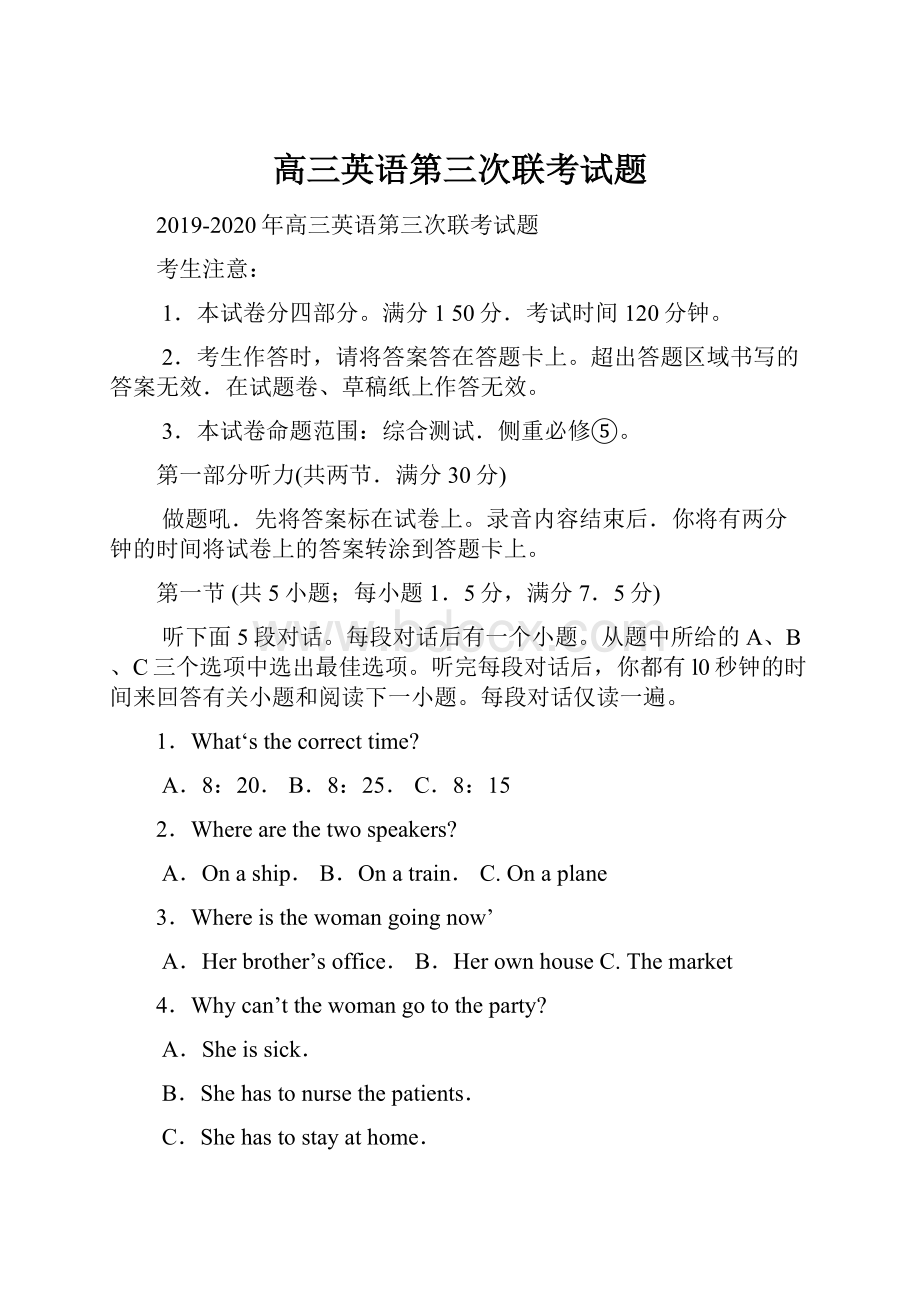高三英语第三次联考试题.docx
《高三英语第三次联考试题.docx》由会员分享,可在线阅读,更多相关《高三英语第三次联考试题.docx(17页珍藏版)》请在冰豆网上搜索。

高三英语第三次联考试题
2019-2020年高三英语第三次联考试题
考生注意:
1.本试卷分四部分。
满分150分.考试时间120分钟。
2.考生作答时,请将答案答在答题卡上。
超出答题区域书写的答案无效.在试题卷、草稿纸上作答无效。
3.本试卷命题范围:
综合测试.侧重必修⑤。
第一部分听力(共两节.满分30分)
做题吼.先将答案标在试卷上。
录音内容结束后.你将有两分钟的时间将试卷上的答案转涂到答题卡上。
第一节(共5小题;每小题1.5分,满分7.5分)
听下面5段对话。
每段对话后有一个小题。
从题中所给的A、B、C三个选项中选出最佳选项。
听完每段对话后,你都有l0秒钟的时间来回答有关小题和阅读下一小题。
每段对话仅读一遍。
1.What‘sthecorrecttime?
A.8:
20.B.8:
25.C.8:
15
2.Wherearethetwospeakers?
A.Onaship.B.Onatrain.C.Onaplane
3.Whereisthewomangoingnow’
A.Herbrother’soffice.B.HerownhouseC.Themarket
4.Whycan’tthewomangototheparty?
A.Sheissick.
B.Shehastonursethepatients.
C.Shehastostayathome.
5.WhatistheproblemwithherEnglish?
A.Herspellingisverypoor
B.Herspeakingisnotgood.
C.Herpronunciationisnotgood.
第二节(共15小题;每小题1.5分.满分22.5分)
听下面5段对话或独自。
每段对话或独白后有几个小题,从题中所给的A、B、C三个选项中选出最佳选项。
听每段对话或独白前,你将有时间阅读各个小题,每小题5秒钟;听完后,各小题给出5秒钟的作答时间。
每段对话或独自读两遍。
听第6段材料.回答第6、7题.
6.HowdidJimgethurt?
A.Hewaskickedbyaboy.
B.Hewashitbyafootball.
C.Hefelldownontheground.
7.WhencanJimplaysportsagain?
A.In48hoursB.In4daysC.Inamonth
请听第7段材料.回答第8、9题。
8.Whydoesn’tthemangotowatchTV
A.Hedoesn’tlikewatchingnews.
H.HewantstospendtimewithAnn.
C.HehasnointerestinwatchingTV.
9.Howoldwillthemanbewhenhismotherbuyshimalaptop?
A.10.B.12.C.14
请听第8段材料,回答第10至12题。
10.Whatisthestudytilewomanreadmainlyabout?
A.Mostofthetimepeoplespendonlineatworkiswasted.
B.PeoplespendsometimeonFacebookeveryday.
C.MostpeoplelikesurfingtheInternetathome.
11.WhatdoWCknowaboutthewoman?
A.Heisn’tgoodatmanaginghi'stime.
B.Helikestalkingwithhisfriendsonline.
C.HesurfstheInternettorelaxatwork.
12.Whatisprobablythewoman?
A.Anewspaperreporter.
B.Anofficelady.
C.Aputerexpert.
请听第9段材料,问答第13至16题。
13.Howmanystudentstookthecourse?
A.14.B.15.D.16.
14.WhatdoestheIliaddoi11thecourseon
A.1ie1earnstowritepoems.
B.Hereadswellknownpoems.
C.Heteacheskidspoems。
15.Whatkindofpoemsdoesthemanthinkaregoodpoems?
A.Poemsthatdescribebeautifulthings.
B.Poemsthattirewritteninbeautifulwords.
C.Poems1hatshowreaderstheworldthroughthepoet’seyes.
16.HowdidthekidsrespondtO1hepoemBetweenWalls?
A.Theyshowedinterestinit.
B.Theyfoundittoodifficult.
C.Theyfounditboring.
听第l0段材料,回答第17量20题。
17.Whatistheexhibitionaboutthisyear?
A.Starposters.B.Railwayposters.C.Holidayposters.
18.Howlongwill1heexhibitionlastaday?
A.Sevenhours.B.Sixhours.C.Fivehours.
19.Whatdoesthespeakersuggestpeopledo?
A.WatchAlanBrown’sfilmsonTV.
B.Getticketsfortheexhibitioninadvance.
C.BookseatsfortheRoseGardenimmediately.
20.WherecartpeoplemakeareservationforDetectiveintheShadows?
A.AtTownHall.
B.AttheArtsCenterCinema.
C.AttheTouristCenter.
第二部分阅读理解(共两节,满分40分)
第一节(共15小题;每小题2分.满分30分)
阅读下列短文,从每题所给的A、B、C和D四个选项中,选出最佳选项,并在答题卡上将该项涂黑。
A
Untilrelativelyrecently,thevastmajorityofhumanbeingslivedanddiedwithouteverseeingacity.Thefirstcitywasprobablyfoundednomorethan5,500yearsago.Buteven200
yearsago,onlyafewpeoplecouldliveillcities.Infact,nearlyeveryonelivedonfarmsorintinyruralvillages.Itwasnotuntilthe20thcenturythatGreatBritainbecamethefirsturbansocietyinhistory--asocietyinwhichthemajorityofpeopleliveincitiesanddonotfarmforaliving.
Britainwasonlytilebeginning.Soonmanyotherindustrialnationsbecameurbansocieties.Theprocessofurbanization--themigrationofpeoplefromthecountrysidetothecitywastheresultofmodernization.whichhasrapidlytransformedhowpeopleliveandwheretheylive.
In1900,fewerthan40%ofAmericanslivedinurbanareas.Today,over82%ofAmericansliveincities.Onlyabout2%liveonfarms.Therestliveinsmalltowns.
Largocitieswereimpossibleuntilagriculturebecameindustrialized.Eyeninadvancedagriculturalsocieties.ittookaboutninety-fivepeopleonfarmstofeedfivepeopleincities.Thatkeptcitiesverysmall.Untilmoderntimes,thoselivingincitiesweremainlytherulingelite(精英)andtheservants,laborersandprofessionalswhoservedthem.Citiessurvivedbytaxingfarmersandwerelimitedinsizebytheamountofsurplus(多余的)foodthattheruralpopulationproducedandbytheabilitytomovethissurplusfromfarmtocity.
Overthepasttwocenturies,theIndustrialRevolutionhasbrokenthisbalancebetweenthecityandthecountry.Modernizationdrewpeopletothecitiesandmade.farmersmoreproductive.Today,insteadofneedingninetyfivefarmerstofeedfivecitypeople,oneAmericanfarmerisabletofeedmorethanahundrednonfarmers.
21.Whendidthefirstcityappear?
A.Untilthe20thcentury.B.200yearsago
C.5,500yearsago.D.In1900.
22.Whichcountryisthebeginningofurbansociety?
A.Chinese.B.American.C.Britain.D.India
23.flowdoesthewriterreflecttheexpansionofurbanizationinthethirdparagraph?
A.Byexamples.B.Byproverbs.
C.Byparisons.D.Bystatistics.
24.Today,whycanthecitybeparticularly1arge?
A.Nonfarmershavebeeless.
B.Agriculturebecameindustrialized.
C.Foodthattheruralpopulationproducedisbeinglessand1ess.
D.Peoplepreferto1iveinthecity.
B
Jimsufferedheartproblems.InconversationheexpressedlittlejoyandiLseemedthathislifewasdrawingtoaclose.
Whenhisheartproblemsledtooperation,Jimwentthroughitsuccessfully,antiafullrecoverywasexpected.Withindays,however.hisheartwasnotbeatingproperly.Jimwasrushedbacktooperation.butnothingwasfoundtoexplainthecauseofhisillness.Fiediedontheoperatingtameonthedaybeforehis48thbirthday.
Dr.BruceSmoller.apsychologist,hadhadmanyconversationswithhim,andthemore
helearned.thestrangerIlerealizedJimscasewas.WhenJimwasachild。
hisfather,ateacher,sufferedaheartattackandstayedhometorecover.OnemorningJimaskedhisfathertolookoverhishomework.promising10ehomefromschoolatnoontopickitup.Hisfatheragreed,butwhenJimreturnedhisfatherhaddied.Jimsfatherwas48.
“Ithinka11hislireJimbelievedhekilledhisfather,”Dr.Smollersays.“Hefeltthatif
hehadnotaskedhimtolookathishomework,hisfatherwouldhavelived.Jimhadbeentroubledbytheidea.Theoperationwasthetrialhehadexpectedforfortyyears.”SmollerbelievesthatJimwilledhimselfnottolivetotheageof48.
Jim’scaseshowsthepowerfulrolethatattitudeplaysinphysicalhealth,andthatchildhoodexperiencesproduceafar—reachingeffectonthehealthofgrown-ups.AlthoughmostcasesarelessdirectthanJim’s.studiesshowthatchildhoodevents,besidesgenes(基因),maywellcausesuchmidlifediseasesascancer,heartdiseaseandmentalillness.
25.Whatisthestateof¨illinmunication?
A.Happy.B.Exhausted.C.Sad.D.Confident.
26.________,whichmadeDr.SmolIerfeelstrangeaboutJimscase.
A.BothJimandhisfatherdiedofthesamedisease
H.Jimdiedontheoperatingtable
C.Jimdiedatayoungage’
D.Jim’sdeathiscloselyconnectedwithhisfather’s
27.WhatcanwelearnFromSmoller’swords?
A.SmollerbelievedJimwouldn’tlivetotheageof48.
B.Jimthoughthewouldbepunishedsomeday.
C.SmolleragreedthatJimdidkillhisfather.
D.Jim’sfathercaredlatticabouthisstudy.
28.Accordingtothetext,thefollowinghaveastrongeffectonnile’sphysicalhealthEXCEPT__________。
A.one’sgenes.B.one’slifeinchildhood.
C.one’sphysicaleducation.D.theopinionsonehasaboutsomething.
C
“It’srainingcatsanddogs!
”AlthoughthisphraseisnotverymoninEnglandanymore.itclearlyshowshowwedon’talwayssaywhatwemean.Onethingthatisoftenfrustratingforlanguagelearnersisthattheyunderstandeverywordinasentenceandyetthemeaningremainsunclearlikethissentencethatactuallymeans“it’srainingveryheavily!
”However,it’snotjustidiomsthatcausedifficultiesforpeoplelearningEnglish.
TheBritishareoftenconsideredtobepolitehutthisCallheveryconfusingfornon-nativespeakers,Weoftendon’tsaywhatwearethinking—infactweoftensaytheopposite!
Here’sanexamplethatwillhopefullyexplainwhatImean:
“Youshoulderoundfortea!
”
Isthisagenuineinvitationoristhepersonjustbeingpolite?
sterc01ypically(典型地),Britishpeoplearelessopenthanpeoplefromothercultures,sowearen’tasquicktoinvitepeopleintoourhomes.Thisphraseisoneofthosethatwesayhutoftendon’treallymean,sowhennofurtherdetailsaregiven,youcanprobablyassumeitwasmadeinthenameofpoliteness!
Buthowdoesthisparetoothercountries?
WhenIlivedinIndia.10tsofpeoplewouldinvitemeintotheirhomeshutIalwaysassumedthattheywerejustbeingpolite.Ofcourse,Iwaswrong.Theinvitationswerealmostalwaysgenuine,antipeopleexpectedmetovisitthem.1wasalwayssurprisedbyhowwelingpeoplewere.Infact,TthinkTspentmoretimeatotherpeople’shousesthanmyown!
Thissummer,whileworkinginAustria,oneofnayflatmates(室友)mademcthinkaboutinvitationsagain.SheinvitedmetoJoinherandherboyfriendforamealout.A1thoughtouchedbytheinvitation,IimmediatelyassumedthatshewasjustbeingpolitesoItoldherthatIdidn’twanttointrude.Sherepliedwith·“IfIdidn’twantyoutoe,Iwouldn’thaveinvitedyouinthefirstplace!
”Thattaughtmepolitenessisculturallydefined.
29.Generallyspeaking·theBritishpeopleare__________.
A.sensitiveB.openC.confidentD.conservative
30.Accordingtothewriter,ifanIndiafriendinvitesyouintohishomeyou’dbetter_______。
A.goB.ignoreitC.thinkit’sonlypoliteD.thinkit’sajoke
31.Theunderlinedphrase“in